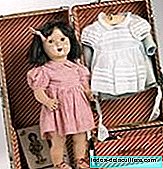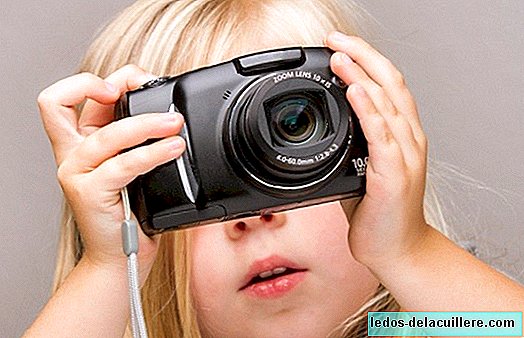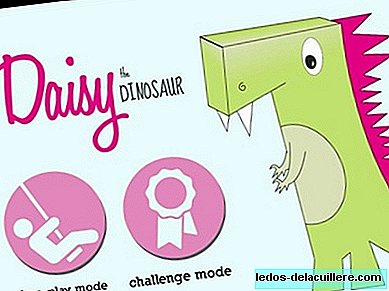
We continue today interviewing psychologist Valentina Ganem thinking about daycare centers, adaptation and the alternatives that parents have. Today we will talk especially about how to help children accept new places and people who will take care of them and the anguish of separation.
How to help our children to their optimal adaptation?
When we decide to take our children to daycare or to the care of another person, it is to be expected and it is completely normal for them to have "separation anguish."
"Separation anguish" is rooted in love; Therefore, we should face it with understanding and respect.
I always ask parents: What would you feel if a person, whom you love deeply, tells you that, once you cross the door, you will never see her again? The normal and expected is that you hold on and beg the person not to cross the door and not disappear.
Our children feel that. They still do not understand that you are going back, since your brain is not prepared to understand that you will only leave for a moment. Do you remember the day your son was born? When did you smile for the first time? When did he extend his arms to give you a hug? Every act, word, caress, look ... reinforces the bond and helps mature your love. Your presence becomes part of your life, it gives you security and confidence. When you are present you are telling him that everything is going well
Do you mean that separation anguish is normal and healthy?
Of course, when your child has "separation anguish," it is a sign that he is developing intellectually. He is realizing that you are no longer there, that he needs you and that he will not passively accept any "danger" situation.
Is that evolving?
Gradually your child will mature, learn about the world around him and will understand that he can be safe with another person, who can separate, that you will return and that everything will be fine while you are not. This he called a "safe and healthy separation." In this phase, like so many others throughout its development, it will pass. But it is necessary that you have an attachment and an emotional, solid and secure bond with you. That way you can trust other people when they are not with you and the separation will be easier. The "separation anguish" is a cycle and therefore will have many ups and downs. There will be better and worse weeks. Remember that everything is a process, nothing is spontaneous.
Can you give us some tips for adaptation to separation for parents who will face that in a short time?
Of course, Mireia, I would love to help you.
Preparation is important. Tell him that they will go to a very special place and tell him what will happen: what is the nursery, what will he do, who will take care of it, that you will take it and pick it up at a certain time (or, the person assigned) , which is something good and fun, that will be very good and will enjoy a lot. Reading stories to our child about daycare will help you fight your own fears and concerns. The little ones can identify with the emotions of the protagonists and, knowing the outcome of the story, will help them to face their own feelings with a feeling of greater control. I know that many institutions give a week of adaptation with parents, within the nursery. But some do not. In my opinion, it is very important that they have that time; but not only a week, but as long as necessary. Each child is different and will live the "separation anguish" with different intensity. Your little one trusts you and if he sees that you accept that "new place", he can be calmer.
No child should cry in the process of adapting to daycare!
What things should we keep in mind at all times to help them better and contain them without suppressing emotions?
Explain that it is normal for him to be sad when someone is missed. Validating your emotions will help you understand them and then accept them. Your little one needs you to accompany him in his relief. We, the parents, have a responsibility for the emotional safety of our children. You never have to tell him that nothing happens, because if it happens! You can say: I see that going to the guard makes you nervous and sad because you will not be with mom, but you will play, jump ... and later I will return for you and give you many kisses and many hugs. What advice would you give regarding the educator? I recommend that there be a lot of closeness with the educator; if possible, to "hug" him and, at the same time, present him to your son. You can say: "Look Juan, Maria is my friend, you will play a lot with her and she will take care of you very well." Remember that your child trusts you, and if he sees that you are close to the person who will take care of him, he will gradually understand that he will take care of him and protect him when you are not. What is your opinion of the advice of sneaking away without the child noticing? If you sneak away you will only get the child to live in constant anguish and insecurity. No matter how small it is; you have to talk to him, go around the place with him and say “I'm leaving, you're going to stay with my friend, I'll come back later for you; and when I return, I will give you a big hug and we will go home together. ” Since you explained to your little one, say goodbye naturally and, of course, tell him they will return for him. And smile at your son. Even if you are very distressed and sad, show safety. It is important for him to see you safe and calm, since if you are sad and distraught, he will worry; He will think: "This is dangerous because mom and dad are worried." Is it good to give him something that reminds him of his parents or is he going to increase his nostalgia? It's good. You can give him a key ring, a scarf, a bracelet, a little ball, his favorite object ... any object that makes him feel close to you. This will help you remember that you will return and will help you in your wait. What conditions should an ideal daycare meet? A nursery would have to be a “loving extension of home,” not just an academic center. A place where parents are free to enter and leave the classrooms. What can they play and participate in the activities. A place where they provide free play material and spaces. A place where they respect the development of each child and know how to sustain the emotions of your child. Each child is different and their needs are also different. It is important to remember that the adaptation period can last between one day and several months. We thank the psychologist Valentina Ganem the time she has dedicated to Babies and more in this double interview and we hope that it has helped you to be able to choose the best care option for your child if it is necessary to leave it with other people.The adaptation to the nursery must be personalized.












